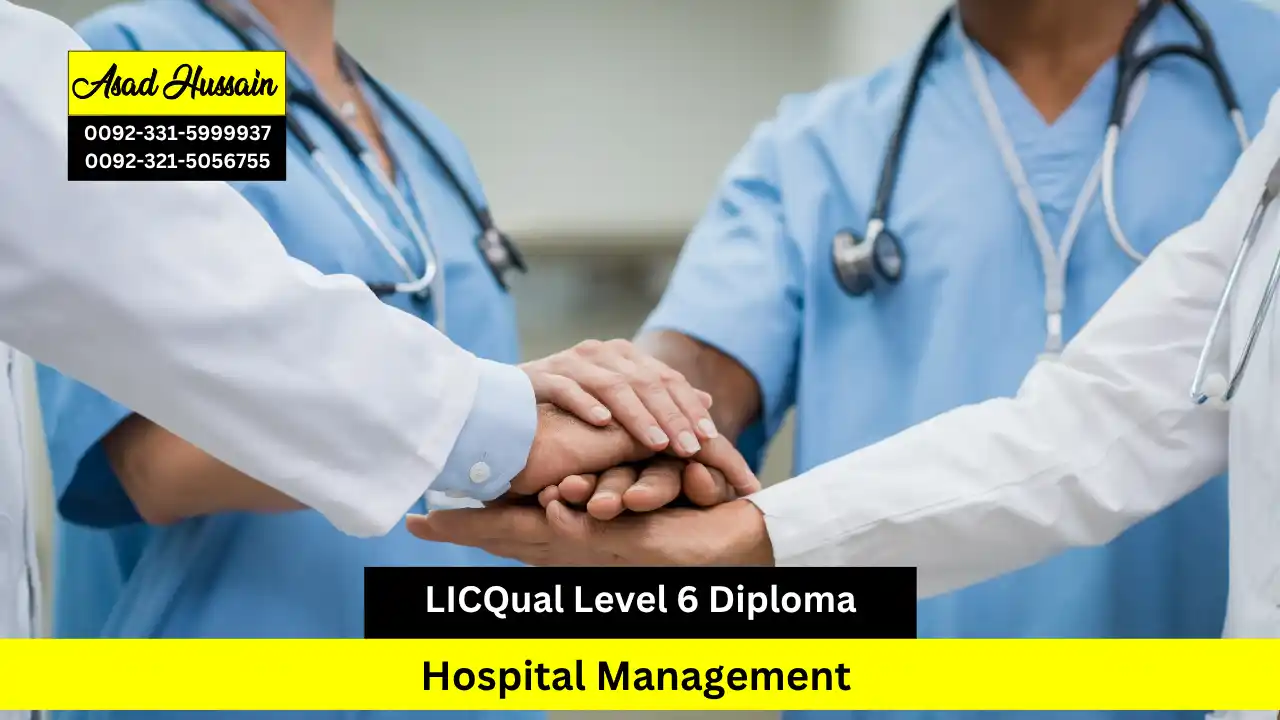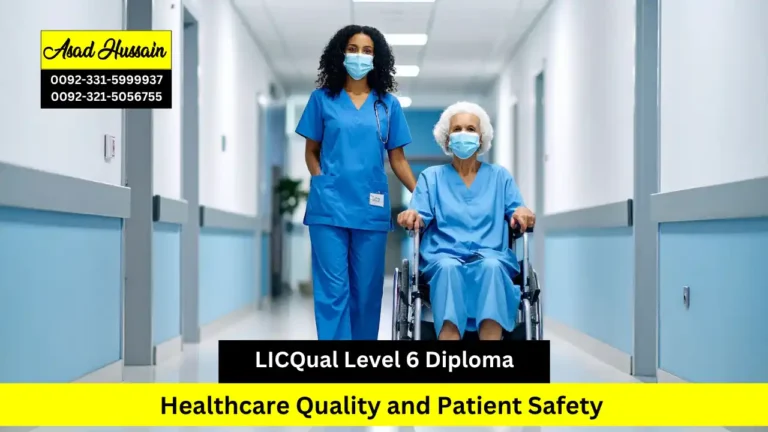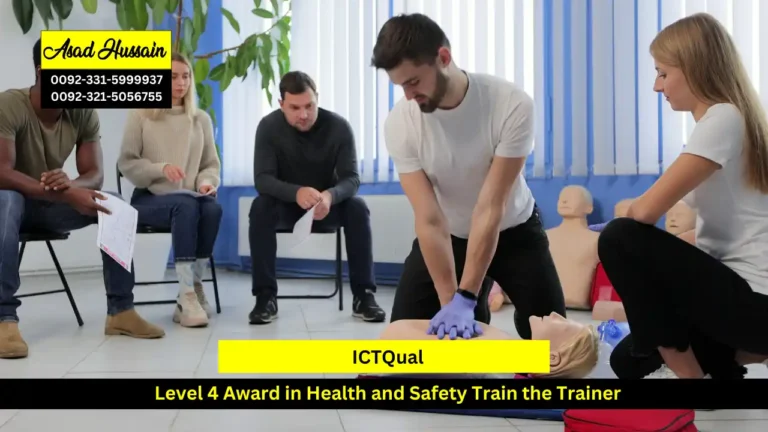The LICQual Level 6 Diploma in Hospital Management is an internationally recognized qualification designed for healthcare professionals and aspiring leaders aiming to master the complexities of hospital operations, healthcare systems, and administrative excellence. In today’s rapidly evolving healthcare landscape, effective hospital management is essential to ensure quality patient care, operational efficiency, and financial sustainability. This qualification equips learners with the skills and expertise required to lead healthcare institutions with professionalism, strategy, and innovation.
LICQual Level 6 Diploma in Hospital Management develop competent professionals who can take on senior administrative and managerial roles within hospitals and healthcare organizations. The course Hospital Management offers a comprehensive understanding of healthcare policies, leadership dynamics, human resource management, and hospital operations, preparing learners to handle real-world challenges with confidence. It also enhances strategic thinking and decision-making capabilities essential for hospital leaders in both public and private healthcare sectors.
Learners will gain in-depth knowledge of healthcare quality management, financial control, resource allocation, and organizational governance. This qualification emphasizes practical applications such as managing hospital workflows, improving patient satisfaction, and ensuring compliance with healthcare regulations. The program Hospital Management also focuses on developing leadership, communication, and problem-solving skills—key competencies that enable professionals to manage multidisciplinary healthcare teams effectively.
The LICQual Level 6 Diploma in Hospital Management also explores critical areas like hospital planning, digital transformation in healthcare, and sustainable healthcare delivery models. Learners will understand how to integrate technology and data-driven strategies to enhance hospital performance, safety, and service quality. This makes the qualification highly relevant for the modern healthcare industry where efficiency and innovation are vital.
This diploma Hospital Management is ideal for hospital administrators, healthcare managers, clinical supervisors, and professionals aiming for leadership positions in healthcare management. It serves as a progression route to advanced qualifications or roles in hospital operations, healthcare consulting, and strategic management. Graduates will be equipped to lead healthcare organizations that uphold excellence, patient safety, and ethical governance.
By completing the LICQual Level 6 Diploma in Hospital Management, learners will position themselves as skilled and credible professionals capable of managing complex healthcare systems. This qualification enhances employability, supports career growth, and contributes to the overall improvement of global healthcare management standards. With its focus on leadership, quality, and innovation, this diploma Hospital Management empowers learners to make a lasting impact on healthcare institutions and communities worldwide.
Program Highlights
Mandatory Units
- Principles of Hospital Management
- Strategic Planning and Leadership in Hospitals
- Healthcare Law, Ethics, and Governance
- Financial Management and Resource Allocation
- Quality Assurance, Risk, and Safety Management
- Project and Change Management in Healthcare
The LICQual Level 6 Diploma in Hospital Management is a professionally structured qualification designed for individuals aiming to advance their careers in hospital administration and healthcare leadership. As global healthcare systems evolve, the demand for qualified professionals capable of managing hospitals efficiently, ensuring high-quality patient care, and maintaining organizational excellence continues to rise. This qualification provides learners with the advanced managerial, analytical, and leadership skills required to excel in the complex and dynamic field of hospital management.
Age Requirements
- Applicants must be at least 18 years old at the time of enrolment.
- Candidates below 18 may be considered only with written parental or guardian consent and evidence of maturity and readiness for higher-level academic study.
Educational Requirements
- A minimum of a Level 5 Diploma or equivalent qualification in a relevant field (such as healthcare management, business administration, or public health) is required.
- Previous academic background in healthcare administration, management, or related disciplines is beneficial but not mandatory.
- Learners should possess a solid understanding of fundamental management principles and a keen interest in hospital operations.
Professional Experience
- While not compulsory, having 1–3 years of professional experience in healthcare management, hospital administration, or related roles is preferred.
- Practical exposure to healthcare operations, quality assurance, patient care coordination, or hospital planning provides a strong foundation for this qualification.
- Candidates with supervisory or mid-level management experience in healthcare settings will benefit from enhanced practical understanding.
English Language Proficiency
- Strong English reading, writing, and communication skills are essential for academic success and professional competency in this diploma.
- International applicants must demonstrate English proficiency through recognized assessments such as IELTS (minimum overall score of 5.5) or an equivalent qualification.
- Candidates who do not meet the language requirement may be considered if they have completed prior education in English or can demonstrate equivalent proficiency.
Learners who meet these entry requirements will be well-positioned to excel in the LICQual Level 6 Diploma in Hospital Management, gaining in-depth knowledge of healthcare leadership, hospital operations, and organizational governance. This qualification prepares professionals to handle high-level responsibilities in healthcare administration, focusing on efficiency, patient safety, and service excellence. Graduates may progress to advanced qualifications such as the LICQual Level 7 Diploma in Healthcare Management or pursue senior roles in hospital leadership, healthcare consultancy, and policy development.lanning, and environmental governance.
The LICQual Level 6 Diploma in Hospital Management is an advanced and internationally recognized qualification designed to equip learners with the strategic, operational, and leadership skills required to manage modern healthcare facilities effectively. Upon completion of this diploma, learners will gain a deep understanding of hospital administration, governance, policy implementation, and quality management practices that drive organizational excellence. The following learning outcomes outline the specific competencies, knowledge, and practical applications learners will achieve across each key unit of the program.
Principles of Hospital Management
• Understand the fundamental concepts, functions, and scope of hospital management in modern healthcare systems.
• Apply management theories and organizational principles to improve hospital operations and patient services.
• Analyze the structure, roles, and responsibilities of hospital departments to ensure efficient coordination and communication.
• Evaluate the impact of healthcare policies, systems, and administrative frameworks on hospital performance.
• Develop problem-solving and decision-making abilities for addressing operational challenges within hospital environments.
Strategic Planning and Leadership in Hospitals
• Formulate effective strategic plans that align hospital objectives with long-term healthcare goals and public needs.
• Demonstrate leadership skills that foster collaboration, motivation, and innovation among healthcare teams.
• Assess organizational strengths, weaknesses, opportunities, and threats (SWOT) to inform strategic decision-making.
• Implement performance management systems that enhance hospital productivity and staff development.
• Lead organizational change initiatives that promote sustainable growth and service excellence in healthcare delivery.
Healthcare Law, Ethics, and Governance
• Interpret and apply healthcare laws, policies, and regulatory frameworks relevant to hospital administration.
• Analyze ethical principles and dilemmas in clinical and administrative decision-making.
• Develop governance structures that promote transparency, accountability, and patient-centered care.
• Ensure compliance with local, national, and international healthcare regulations and accreditation standards.
• Evaluate the impact of ethical and legal considerations on hospital policies, risk management, and quality assurance.
Financial Management and Resource Allocation
• Understand the fundamentals of healthcare finance, budgeting, and cost-control mechanisms in hospital settings.
• Apply financial planning techniques to optimize the allocation of resources and enhance operational efficiency.
• Evaluate financial performance indicators to support data-driven decision-making and sustainability.
• Develop budgetary strategies that balance patient care quality with financial responsibility.
• Utilize accounting and reporting tools to ensure financial transparency and regulatory compliance.
Quality Assurance, Risk, and Safety Management
• Design and implement hospital quality assurance frameworks that promote patient safety and service excellence.
• Identify and mitigate potential risks through structured hospital risk management systems.
• Evaluate safety protocols and infection control measures to maintain healthcare standards.
• Conduct performance audits and continuous improvement initiatives for quality enhancement.
• Promote a culture of accountability, patient satisfaction, and evidence-based practice within hospital operations.
Project and Change Management in Healthcare
• Apply project management principles to plan, execute, and evaluate hospital improvement projects.
• Develop strategies for managing organizational change and overcoming resistance within healthcare teams.
• Utilize data analysis and performance metrics to measure project success and sustainability.
• Coordinate multidisciplinary teams to achieve project goals and improve healthcare delivery outcomes.
• Integrate innovation and technology-driven solutions to enhance hospital efficiency and service quality.
Upon successful completion of the LICQual Level 6 Diploma in Hospital Management, learners will possess the strategic insight, leadership competence, and technical expertise necessary to manage hospital operations effectively. They will be equipped to contribute to healthcare system development, implement sustainable management practices, and lead organizations toward excellence in patient care and operational performance. This diploma not only enhances employability but also prepares professionals for leadership roles in hospital administration, healthcare consultancy, and policy development globally..
The LICQual Level 6 Diploma in Hospital Management is an internationally recognized qualification designed for individuals seeking to develop advanced expertise in hospital administration, leadership, and strategic healthcare management. In today’s complex healthcare environment, hospitals face challenges such as operational efficiency, patient safety, regulatory compliance, and financial sustainability. This diploma equips learners with the knowledge, skills, and practical strategies required to manage hospital operations effectively, improve service delivery, and lead healthcare teams with confidence. Graduates are prepared to implement evidence-based practices that enhance organizational performance and patient care outcomes.
Hospital Administrators and Operations Managers
• Professionals aiming to specialize in hospital administration and operational leadership.
• Administrators seeking to enhance efficiency, optimize processes, and manage hospital resources effectively.
• Learners motivated to implement evidence-based practices for service improvement and patient satisfaction.
• Individuals responsible for overseeing daily hospital operations, including staffing, logistics, and facility management.
• Professionals aspiring to strengthen governance, compliance, and quality standards in hospital settings.
Healthcare Leaders and Policy Advisors
• Hospital executives and managers developing strategic plans and leadership competencies.
• Policy advisors applying healthcare regulations, frameworks, and governance principles to improve hospital systems.
• Professionals seeking to integrate innovative management approaches and performance monitoring tools.
• Learners aiming to foster collaboration, accountability, and staff development within healthcare organizations.
• Leaders committed to aligning hospital objectives with national and international healthcare standards.
Supervisors and Departmental Heads
• Supervisors responsible for coordinating multidisciplinary hospital teams and ensuring operational efficiency.
• Departmental heads applying management principles to optimize workflows, budgets, and resource allocation.
• Professionals utilizing data and performance metrics to enhance departmental performance.
• Leaders fostering a culture of safety, accountability, and continuous improvement in hospital departments.
• Individuals working to ensure patient-centered care while maintaining regulatory compliance and operational effectiveness.
Healthcare Practitioners in Administrative Roles
• Doctors, nurses, and allied health professionals aspiring to leadership and administrative responsibilities.
• Practitioners integrating clinical knowledge with management practices to improve hospital services.
• Health professionals contributing to policy implementation, workflow optimization, and patient care quality.
• Learners developing competencies in risk management, compliance, and strategic decision-making.
• Clinicians preparing for leadership positions requiring operational and administrative expertise.
Career-Focused Learners and Future Hospital Leaders
• Individuals pursuing careers in hospital management, healthcare consultancy, or administrative leadership.
• Learners aiming to advance their professional growth through strategic management and operational expertise.
• Professionals preparing for progression to higher-level qualifications or executive healthcare roles.
• Career-oriented individuals dedicated to improving hospital performance, patient outcomes, and service quality.
• Learners motivated to lead sustainable, efficient, and innovative hospital operations.
The LICQual Level 6 Diploma in Hospital Management is ideal for learners committed to advancing their careers in healthcare leadership and administration. It equips professionals with the strategic insight, operational skills, and leadership competencies needed to manage hospitals effectively. Graduates will be prepared to assume senior management roles, drive organizational excellence, and contribute to the delivery of high-quality, sustainable healthcare services worldwide.







